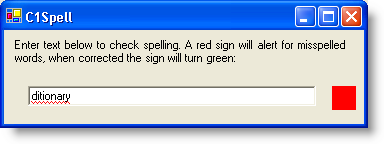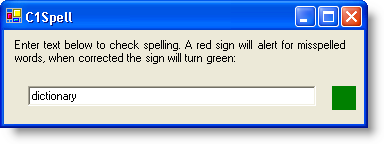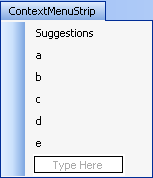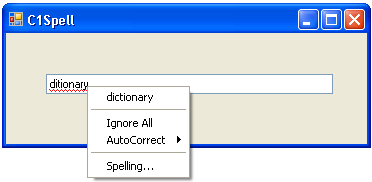The following topics demonstrate the methods, good for general data entry tasks, of spell checking using the C1Spell class.
Showing a red sign
The following steps show how to use a red sign to signal misspelled words as you type. This topic uses the CheckTyping method and calls the TypingError event. Complete the following steps:
1. To connect the C1Spell component to the textbox control, double-click the form and enter the following code in the Form_Load event handler:
Me.C1Spell1.CheckTyping(Me.TextBox1)
• C#
this.c1Spell1.CheckTyping(this.textBox1);
2. To show a red sign for misspelled words call the TypingError event, and to show a green sign for correctly typed words call the TypingOK event. Add the following code:
Private Sub C1Spell1_TypingError(ByVal sender As System.Object, ByVal e As C1.Win.C1Spell.TypingErrorEventArgs) Handles C1Spell1.TypingError
' show red light to indicate an error was detected
Panel1.BackColor = Color.Red
End Sub
Private Sub C1Spell1_TypingOK(ByVal sender As System.Object, ByVal e As C1.Win.C1Spell.TypingOKEventArgs) Handles C1Spell1.TypingOK
' typed something right? Use green color.
Panel1.BackColor = Color.Green
End Sub
• C#
private void c1Spell1_TypingError(object sender, C1.Win.C1Spell.TypingErrorEventArgs e)
{
// show red light to indicate an error was detected
this.panel1.BackColor = Color.Red;
}
private void c1Spell1_TypingOK(object sender, C1.Win.C1Spell.TypingOKEventArgs e)
{
// typed something right? Use green color.
this.panel1.BackColor = Color.Green;
}
This topic illustrates the following:
Here is what each form should look when an incorrect word or correct word is typed, respectfully.


Creating a pop-up menu
To provide as-you-type spell checking using the pop-up menu, complete the following steps:
1. Place a C1Spell component and ContextMenuStrip control on the form.
![]()
2. From the component tray, select the ContextMenuStrip control to view the control on the form. Place your cursor over "Type Here" and enter the following menu items:

3. Note that the default property for TypingErrorAction property is BeepandUnderline. You may choose a different action for the TypingErrorAction property, see the TypingErrorActionEnum enumeration members.
4. To connect the C1Spell component to the textbox control, double-click the form and enter the following code in the Form_Load event handler:
Me.C1Spell1.CheckTyping(Me.TextBox1)
• C#
this.c1Spell1.CheckTyping(this.textBox1);
5. To call the TypingError event, enter the following code:
Private Sub C1Spell1_TypingError(ByVal sender As System.Object, ByVal e As C1.Win.C1Spell.TypingErrorEventArgs) Handles C1Spell1.TypingError
C1Spell1.TypingErrorAction = C1.Win.C1Spell.TypingErrorActionEnum.Underline
' use CheckString method to build a list of suggestions
C1Spell1.CheckString(e.ErrWord, C1.Win.C1Spell.BadWordDialogEnum.NoDialog)
' if no suggestions, just quit
If C1Spell1.Suggestions.Count = 0 Then Exit Sub
' now select the word
TextBox1.Select(e.SelStart, e.SelLength)
End Sub
• C#
private void c1Spell1_TypingError(object sender, C1.Win.C1Spell.TypingErrorEventArgs e)
{
this.c1Spell1.TypingErrorAction = C1.Win.C1Spell.TypingErrorActionEnum.Underline;
// use CheckString method to build a list of suggestions
this.c1Spell1.CheckString(e.ErrWord, C1.Win.C1Spell.BadWordDialogEnum.NoDialog);
// if no suggestions, just quit
if (this.c1Spell1.Suggestions.Count == 0)
return;
// now select the word
textBox1.Select((int)e.SelStart, (int)e.SelLength);
}
6. To create a context menu that includes more than one spelling suggestion, use the following code:
' build the context menu if there are at least two suggestions
' and put the suggestion words as the menu texts
Dim i As Integer
For i = 1 To 5
Me.ContextMenuStrip1.Items(i).Visible = False
Next
Me.ContextMenuStrip1.Items(0).Text = e.ErrWord & " (not in dictionary)"
For i = 1 To 5
If i > 5 Then Exit For
If C1Spell1.Suggestions.Count < i Then Exit For
Me.ContextMenuStrip1.Items(i).Text = C1Spell1.Suggestions(i - 1)
Me.ContextMenuStrip1.Items(i).Visible = True
Next
' Show the context menu at the current caret position
' note that the caret position is the screen position and it
' should be transferred to the client position for each textbox
Dim pos As Point
Dim x, y
x = C1Spell1.CaretPosX
y = C1Spell1.CaretPosY
pos = New Point(x, y)
pos = TextBox1.PointToClient(pos)
Me.ContextMenuStrip1.Show(TextBox1, pos)
• C#
// build the context menu if there are at least two suggestions
// and put the suggestion words as the menu texts
for(int i = 1; i <= 5; i++)
this.contextMenuStrip1.Items[i].Visible = false;
this.contextMenuStrip1.Items[0].Text = e.ErrWord + " (not in dictionary)";
for( int i = 1; i <= 5; i++)
{
if (this.c1Spell1.Suggestions.Count < i)
break;
this.contextMenuStrip1.Items[i].Text = this.c1Spell1.Suggestions[i-1];
this.contextMenuStrip1.Items[i].Visible = true;
}
// Show the context menu at the current caret position
// note that the caret position is the screen position and it
// should be transferred to the client position for each textbox
Point pos = new Point((int)this.c1Spell1.CaretPosX, (int)this.c1Spell1.CaretPosY);
pos = this.textBox1.PointToClient(pos);
this.contextMenuStrip1.Show(this.textBox1, pos);
7. The following code selects the error word and replaces it with the correctly spelled menu item chosen by the user:
' this sub routine will select the error word
Private Sub SetSelection(ByVal start As Integer, ByVal length As Integer)
TextBox1.Select(start, length)
End Sub
Private Sub menuItem_Click(ByVal sender As System.Object, ByVal e As System.EventArgs)
' ignore this word
Me.C1Spell1.IgnoreAllWord = True
End Sub
' this sub routine will change the error word to val
Private Sub ChangeText(ByVal val As String)
Me.TextBox1.SelectedText = val
End Sub
• C#
private void SetSelection(int start, int length)
{
textBox1.Select(start, length);
}
private void menuItem_Click(object sender, EventArgs e)
{
// ignore this word
this.c1Spell1.IgnoreAllWord = true;
}
// this sub routine will change the error word to val
private void ChangeText(string val)
{
this.textBox1.SelectedText = val;
}
This topic illustrates the following:
Type a word in the box. If it is misspelled, it will beep and underline. Right-click the word to view the spelling suggestions from the pop-up menu:

|
